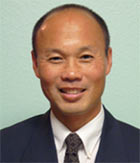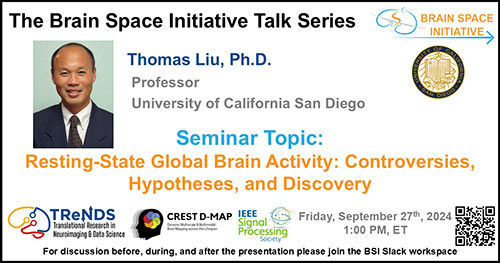Sep
27

Date: 27 September 2024
Time: 1:00 PM ET (New York Time)
Presenter(s): Dr. Thomas Liu
Meeting information:
Meeting number: 2630 201 5531
Password: X8q4rxFkZD4 (98747935 when dialing from a phone or video system)
Join by phone:
+1-415-655-0002 US Toll
Access code: 2630 201 5531
Join us Friday, September 27th, 2024, at 1:00 PM ET for an exciting virtual talk by Dr. Thomas Liu entitled: “Resting-State Global Brain Activity: Controversies, Hypotheses, and Discovery” as part of the activities of the Brain Space Initiative, co-sponsored by the Center for Translational Research in Neuroimaging and Data Science (TReNDS) and the Data Science Initiative, IEEE Signal Processing Society.
Abstract
Resting-State Global Brain Activity: Controversies, Hypotheses, and Discovery:
Resting-state fMRI (rsfMRI) has gained widespread adoption as an approach for studying the human brain, but there is still a great deal of variability in the use of the myriad processing and analysis methods that are available. In particular, the field has struggled with how best to address the effects of global fluctuations in brain activity. While global signal regression (and its variants) constitute a widely adopted approach for addressing these effects, there continues to be considerable controversy regarding its use and interpretation. In this talk, I will review the basic properties of the global signal and its widespread presence in the analysis of resting-state fMRI data. I will also discuss the sources of information that are embedded in the global signal and touch upon emerging views of its role in the analysis of rsfMRI studies.
Biography

Dr. Thomas Liu is a Professor of Radiology, Psychiatry, and Bioengineering at the University of California San Diego (UCSD) and the Director of the UCSD Center for Functional MRI (fMRI). He received his Ph.D. in Electrical Engineering from Stanford University, where he developed signal processing methods for detecting ultra-low frequency magnetic fields along earthquake faults. Since joining UCSD in 1999, his research has spanned a broad range of research areas in neuroimaging, including experimental design and analysis, innovative signal processing approaches, characterization and modeling of the fMRI signal, multimodal (fMRI, EEG, MEG) imaging of brain activity, and the development of advanced imaging methods and applications. He is a recipient of the Distinguished Investigator Award from the American Academy of Radiology Research and the Outstanding Teacher Award from the International Society for Magnetic Resonance in Medicine.
Recommended Articles:
- Liu, T. T., Nalci, A., & Falahpour, M. (2017). The global signal in fMRI: Nuisance or Information?. NeuroImage, 150, 213–229.
- Liu, T. T., & Falahpour, M. (2020). Vigilance Effects in Resting-State fMRI. Frontiers in neuroscience, 14, 321.
- Mao, Y., Chen, C., Nguyen, T., & Liu, T. T. (2024). Resting-state global brain activity induces bias in fMRI motion estimates. Imaging Neuroscience, 2, 1-17.

